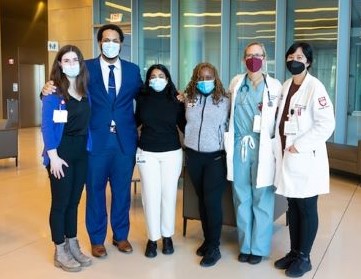[ad_1]
Legal Delivery
UChicago Medicine partners with legal aid lawyers to offer legal help to victims of violence

Members of the University of Chicago Medicine and Legal Aid Chicago’s Recovery Legal Care team. Photo from the University of Chicago Medicine’s Dec. 9 press release.
The University of Chicago Medicine is working with Legal Aid Chicago to embed lawyers at the system’s trauma center in Chicago’s Hyde Park neighborhood to help victims of violence.
Two lawyers with Legal Aid Chicago will be embedded at the trauma center two days per week, according to a Dec. 9 press release and a story by WBEZ.
The program, called Recovery Legal Care, is funded primarily through federal grants. The first year will focus on helping patients obtain public benefits and economic stability. The hope is that it will expand to help with housing, education and employment, according to the press release.
The first lawyer participating in the program, Carly Loughran, meets with patients at their bedsides on Thursdays. A second lawyer was expected to join the program this week.
Loughran thinks that lawyers can build relationships with patients that continue after their hospital release—a time commitment that extends beyond that of hospital social workers. Her group can appeal denials of public benefits, for example, and act as an advocate for victims fighting evictions.
“Lawyers are like social workers with teeth,” Loughran told WBEZ.
Loughran is working as a staff attorney at Legal Aid Chicago as part of an Equal Justice Works two-year fellowship. Recovery Legal Care is an expansion of an existing effort at UChicago Medicine called the Violence Recovery Program.
“Working with thousands of patients recovering from intentional violence, we’ve seen the physical and emotional damage of firearm injuries,” said Franklin Cosey-Gay, director of the Violence Recovery Program, in a press release. “But what doesn’t always get as much attention—but can be equally as damaging—is the stress of things like insecure housing, economic stability and access to public benefits.”
The program is receiving $2.6 million in funding from the National Institutes of Health and the U.S. Department of Justice. If the program is considered a success, it will be eligible for another $3.4 million in federal grants.
[ad_2]




